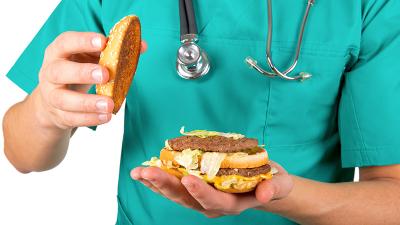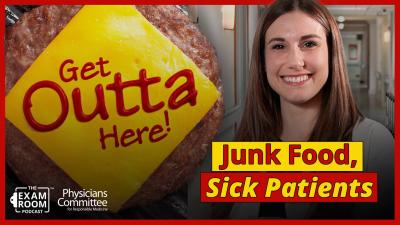Doctors Say Fast Food at JPS Hospital Can Contribute to Heart Disease and Other Life-Threatening Conditions
Cardiologist Will Testify at June 9 JPS Board of Managers Meeting

FORT WORTH, Texas—At the June 9 Board of Managers Meeting, Dallas-based cardiologist John J. Pippin, MD, FACC, will testify that the availability of high-fat fast food at John Peter Smith Hospital puts visitors, patients, and staff at risk for heart disease, diabetes, and other diet-related conditions. Dr. Pippin is representing the 629 Texas members of the Physicians Committee, a nonprofit with more than 17,000 physician members nationwide.
There is currently a McDonald’s restaurant inside John Peter Smith Hospital on the first floor. According to documents obtained by the Physicians Committee through Texas’s Public Information Act, the hospital is no longer bound by a years-long contract with McDonald’s. When the original McDonald’s contract ended in 2019, the hospital added an amendment. The amendment states that the McDonald’s lease may be terminated at any time for any reason by either party with 180 days notice.
WHO: Cardiologist John J. Pippin, MD, FACC, representing the 629 Texas physician members of the nonprofit Physicians Committee.
WHAT: Dr. Pippin will testify at the Board of Managers Meeting for the Tarrant County Hospital District/JPS Health Network.
WHEN: On June 9, the meeting starts at 1 p.m. and the Citizens Wishing to Address the Board section is near the beginning of the meeting.
WHERE: JPS Health Network, OPC Auditorium, Third Floor, 1500 S. Main St., Fort Worth.
NOTE: You do not need to show proof of vaccination, but you must bring a mask.
“In Texas, rates of heart disease and other diet-related diseases are unacceptably high, and greasy fast food, like cheeseburgers, can contribute to these life-threatening conditions,” says Dr. Pippin. “If John Peter Smith Hospital would like to be a place of wellness and healing, it should provide only low-cost, plant-based options that can help people prevent and even reverse high blood pressure, diabetes, and other serious conditions while achieving a healthy body weight.”
“Fast food like beef burgers and milkshakes can cause weight gain, and COVID-19 patients who are overweight or obese are more likely to require invasive mechanical ventilation,” adds Dr. Pippin. “Studies show that COVID patients who follow a plant-based diet are less likely to experience severe symptoms.”
In a complaint to be filed with Tarrant County Commissioner Gary Fickes, the Physicians Committee states that it is urgent that hospitals, including John Peter Smith Hospital, provide plant-based meals that can help people prevent and even reverse obesity, diabetes, high blood pressure, and other diet-related diseases that can put COVID-19 patients at risk for severe illness. The Tarrant County Commissioners appoint the members of the JPS Health Network Board of Managers, and Commissioner Fickes is working to improve patient care at John Peter Smith Hospital, according to his online biography.
As reported by the Washington Post, the Physicians Committee monitors fast food in hospitals and publishes a list of hospitals that host fast food at www.MakeHospitalsHealthy.org. Several hospitals have closed McDonald’s restaurants including large public hospitals like Ben Taub Hospital in Houston and Grady Hospital in Atlanta. In 2009, Parkland Hospital in Dallas closed its McDonald’s restaurant.
Other hospitals that have closed McDonald’s include the Medical Center Navicent Health in Macon, Ga., Children’s Hospital of Georgia in Augusta, Ga., Kosair Children’s Hospital in Louisville, Ky., now called Norton Children’s Hospital, Mercy Medical Center in Des Moines, Iowa, Broward Health Medical Center in Fort Lauderdale, Fla., Jackson Memorial Hospital in Miami, Fla., and Memorial Regional Hospital in Hollywood, Fla. In recent years, about 16 hospitals have closed McDonald’s restaurants.
A study published in the journal Circulation found that people who eat fast food once a week increase their risk of dying from heart disease by 20%. Two to three fast-food meals a week increase the risk of premature death by 50%. Four or more fast-food meals a week increase the risk of dying from heart disease by nearly 80%.
A commentary published in the American Journal of Medicine, “Shoring Up Vaccine Efficacy,” emphasizes that a 2021 case-control study of health care workers in six countries revealed that those following largely plant-based diets had 73% lower odds of developing moderate to severe COVID-19, compared with those following other diets.
A study recently published in the in the American Journal of Lifestyle Medicine shows that during the COVID-19 pandemic, overweight hospital workers at Sibley Memorial Hospital in Washington, D.C., were able to lose weight, lower blood pressure, and otherwise improve their health by following a low-fat plant-based diet.
The American Medical Association has issued a policy urging health care facilities to provide healthful food, including plant-based meals, and meals that are low in saturated fat.
Patients and health care providers are often concerned that healthful foods are more expensive, but St. Joseph Health System in Sonoma County, Calif., reports, “Vegetarian entrées cost about 50 percent less than meat entrées.” The hospital projects saving $5,000 a year by serving more meat-free meals.
Media Contact
Jeanne Stuart McVey
202-527-7316
jmcvey[at]pcrm.org
Founded in 1985, the Physicians Committee for Responsible Medicine is a nonprofit organization that promotes preventive medicine, conducts clinical research, and encourages higher standards for ethics and effectiveness in education and research.







